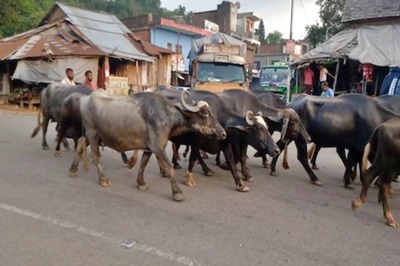
views
New Delhi: The magnificent Sheikh Zayed Grand Mosque served as the perfect backdrop for the grand screening of Umesh Vinayak Kulkarni's third feature film 'Deool' (The Temple). The sea breeze from the Persian Gulf greeted an enthusiastic crowd at the Swiss Open Air theatre of Fairmont Bab Al Bahr hotel. The 5th Abu Dhabi International Film Festival hosted the international premiere of the film, close on the heels of its world premiere at the Mumbai Film Festival. DearCinema Editor Bikas Mishra chatted with Umesh Vinayak Kulkarni before the screening of the film.
Q: Where did the journey for Deool begin?
A: When the shooting for my first feature film Valu got over in a Maharashtra village, we wanted to express our gratitude to the villagers and wanted to help set up a library there. However, villagers didn't want a library and wanted us to help them to renovate their old temple. We were baffled. This was the germ of an idea that we later developed into Deool.
Q: You collaborate with Girish Kulkarni on your screenplays, how does this collaboration work?
A: I do collaborate with Girish but not as a writer, but as a director. My role during the process of writing is purely directorial. I don't co write. Writing is entirely Girish's work. I do read it, discuss it and give my feedback but I react to the draft essentially as a director.
A big test of an idea is how long it remains with you. The germ of Deool remained with us even two years after it first came to us. Girish and I brainstormed and then the first draft was prepared.
Q: You've stuck to the rural setting for all three of your feature films? Any specific reason?
A: I don't mind making all my films in rural setting, if the story demands so. Though Deool is set in a village, it's not a story about a village. It's a story about how people get caught up in the world they create around themselves. In a way, it's similar to my short film Girni, where a middle class family starts a business to support themselves but how their lives get sucked into it.
My friends tell me that my films have a rural setting because I want to escape the big cities.
I reiterate, Deool isn't about a village. It questions the notion of development. I think development is a very urban notion. Rural youth go to colleges-universities these days, they gain degrees and diplomas. This education renders them completely unemployable, they can't find respectable jobs in cities and it fills them up with a false sense of self importance and they look down upon agriculture.
A small tiled roof temple in my village suddenly transforms into an ugly concrete structure and its garbhagriha (sanctum sanctorum) is decorated with bathroom tiles! Deool is a take on this notion of development.
Q: Location plays a very important role in your films.
A: I won't shoot a film until I find the right location. For Deool, it took us seven months to find the location. In my films, location plays a very important role, it becomes a character unto itself.
I have a very special relationship with the Sahyadri ranges. The landscape we live in shapes us. The nature all around us is a reflection of who we are and how we think.
I wanted a village, which depicts the idea of 'in the middle of nowhere'.
Q: Why didn't you go back to the village where you shot Valu, where the germ of this idea came?
A: I would never do that. For me that village is the village of Valu. That village also looks very different, this script demanded a village very different from that one.
Q: Are you trying to broad-base your films, do you want to reach out to masses? What's the thought behind casting Nana Patekar and having an item song in the film?
A: I don't define my audience before making my films. I didn't know how Valu will be received and it ran for months in Maharashtra. Vihir was very different from Valu.
While writing the character of Bhau, we immediately thought of Nana Patekar. He hasn't done such a role before.
What you call an item song isn't an insertion, it's part of the narrative and idea of the film. Every small fry who has done any role in any television serial becomes a celebrity in villages these days. Now the traditional 'tamasha' and 'lavani' has given way to these celebrity dance shows in rural Maharashtra. These so called 'celebrities' dance to the tunes of popular Hindi film numbers. I wanted to depict this phenomenon and also comment on that.
Q: Are you trying to break free from your own style of filmmaking that you established in your first two films?
A: Valu and Vihir were two very different films. Of course, they had things in common.. For me, Deool is a combination of both these films.
I don't want to get caught into the notions about myself. I want to continue to experiment and make films the way I want to make them.
I worked with a new cinematographer for Deool. Sudhakar Reddy is my batchmate from the institute (FTII). We always wanted to work together in a film. The cinematic style of Deool is different from Vihir where camera has a meditative, distant-observer quality. Since, Deool is about about violation of nature, here the camera needed to be much more dynamic. A major part of Deool is shot hand-held.
When we were scouting producers for Valu, all of them wanted to have us songs and dance. I didn't have songs or dance in first two of my films also because producers wanted them. But it's important to question ourselves. I realized that I've drawn a line around me, it's fun to redefine them. Songs and dance sit perfectly within the narrative structure of Deool.
You will see that the three songs in the film also attempt to capture the violation of the nature.
Q: Have you started working on your next film?
A: Not yet. In the meantime I'm producing a film with Girish. It is a Marathi film titled 'Masala'. It's inspired from the real life of an entrepreneur who started 'Praveen Masalewale'. It will be directed by Sandesh Kulkarni.
Deool (The temple) will release in India on November 4. It will be screened at the South Asian International Film Festival in New York on November 10.




















Comments
0 comment